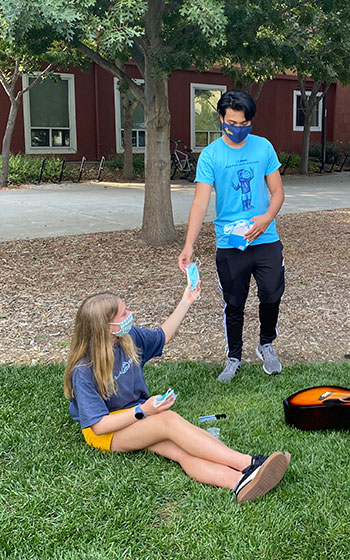Fall quarter marked the start of a new job for students on campus: Aggie public health ambassador. The goal is to help keep everyone safe in the pandemic.
Roughly 250 students are stationed across campus — from the Memorial Union, student housing areas, to the farmers market — to check symptoms, hand out free UC Davis-branded face masks and sanitization items, and educate community members on official COVID-19 guidelines.
In addition to keeping infection rates low, a goal for the program was to give students employment opportunities and to provide them with experience in public health and communications.
Hiring students and fostering peer-to-peer connection was essential said Cory Vu, associate vice chancellor for health, wellness, and divisional resources at UC Davis and one of the leaders of the ambassador program alongside Brad Pollock and Carolyn Dewa, both of the public health sciences department.
“What we’ve learned through other programs is that peer engagement is really powerful so if we can get a student to talk to another student about what healthy behavior is, potentially that interaction could modify a behavior,” said Vu. “Having students in this program really helps to facilitate the togetherness and the connection that we all need to have to beat this pandemic.”

To start, students underwent online training for lessons on the epidemiology and policies of COVID-19, alongside education on proper sanitization and mask usage. Training also included courses in implicit bias, conflict resolution and de-escalation as well as a live virtual session featuring scenarios related to possible noncompliance.
Paola Diaz ’22 said she plans to become a physician’s assistant and jumped at this new job opportunity.
“During COVID, finding a job has been really hard especially with everything being closed down. [Applying] was probably the best decision I could’ve made for myself during quarantine,” said Diaz.
She added she especially likes staying connected to the community. “I think that being an ambassador has increased our sense of togetherness, especially at a time when we’re so isolated from each other. It’s been really fun to build connections with people on campus and be connected to one another and know that we’re all going through this at the same time,” said Diaz.
Whether they are stationed on or off-campus, Vu said that having students serve as informational resources fosters a sense of unity within the community. “When the community sees our students out there encouraging others to participate and engage in healthy behaviors, that sends a very good message to the community that the campus cares, the students care, and we’re all in it together,” said Vu.
Jonathan Kha ’23 said he became an ambassador to better understand the effects of COVID-19 on marginalized communities. “I’ve learned so much about how it affects low-income folks and folks that don’t have many resources, so I wanted to find a way to combat that issue and find ways to help during the pandemic,” said Kha.
As an ambassador, Kha is often stationed by freshman living areas. Having had his own dorm experience cut short last year, Kha said he empathizes with students who are disappointed by missed opportunities. “To imagine myself as a freshman on campus right now, I [know] how hard it must be to make friends and socialize, but also to navigate through campus and college. I enjoy engaging with students in a way that makes them feel more comforted,” said Kha.
Marisa Davidson ’23 also recalled the abrupt end to her in-person freshman college experience, adding the sudden change in her life has been an opportunity for personal growth. “I think this job and the pandemic in general have really made me aware of the importance of being flexible and adaptable to new and changing environments. There are times when things will not always be steady and things won’t always be the way you want them to be,” Davidson said.
Davidson added that being an ambassador taught her that others have different approaches to the pandemic. As an ambassador, her goal is to always remind the campus community of the science-based guidelines imposed at UC Davis.
“This job has definitely opened my eyes to how the message of COVID-19 can be altered. Some people come in with politicized information [and] information that is sometimes not correct. That’s probably the toughest part about this job — trying to educate people who may get information that’s incorrect or politicized and making sure to reign it back in to the science side of it,” said Davidson.
She said she has encountered a few noncompliant visitors who do not understand why they must report their symptoms or wear a mask to walk through a building. Ambassadors are trained to have open conversations about the science-based protocols that are followed on campus. In cases of serious noncompliance, they also can get backup to help address the situation.
In general, Davidson noted, students on campus have been consistently supportive of the program and following health guidelines.
“I’ve had several interactions with students who are grateful that UC Davis has this program because they feel very safe on campus [by seeing] students taking an interest in initiative, protecting one another and protecting the campus from this virus,” said Davidson.
